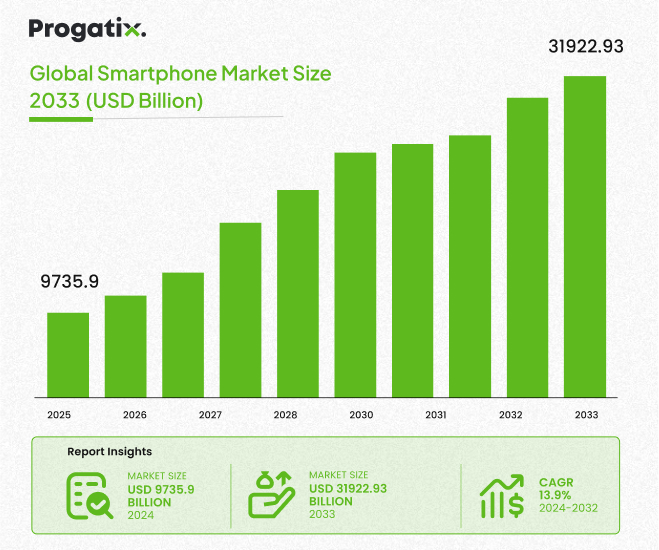Cross Platform App Development Guide For Businesses App Development

What if you could create an app that functions flawlessly on both iOS and Android without having to deal with creating two different versions? The smart option for businesses that seek to maximize effect without straining resources is cross-platform app development. By 2025, when digital transformation is a must, this strategy offers faster outcomes, cheaper expenses, and a wider audience. Ever wonder how this strategy works and why it’s the best option for businesses in 2025? Together, let’s discover the answers.
Why do Businesses Need Cross-Platform App Development in 2025?
It’s a must for businesses to adapt to the quickly evolving digital landscape; it is no longer a choice. Cross-platform app development functions as a game-changing approach that helps businesses meet increasing and evolving customer expectations while leveraging the latest technological advancements.
Key Trends Determining the Demand for Cross-Platform Apps
-
Growing Use of Smartphones
As per Business Research Insight, the global smartphone market size was estimated at around USD 2.09 billion in 2024 and is projected to reach USD 3.32 billion by 2033, increasing at a compound annual growth rate (CAGR) of about 5.3% from 2025 to 2033. The huge amount of users shows that delivering smooth mobile experiences is crucial.
-
The Surge in Remote Work
Apps are essential for improving productivity and cooperation across locations as companies continue to embrace remote work.
-
Evolving Customer Expectations
The modern consumer demands applications that function flawlessly on a variety of devices. Ensuring a seamless multi-device experience has emerged as an essential requirement for client pleasure.
Significant revenue growth is also being driven by mobile apps. Cross-platform apps provide SMEs the ideal option to maximize resources and access this growing market.
Benefits of Cross-Platform App Development for SMEs
Development of cross-platform apps is a useful and effective way to address specific challenges faced by SMEs.
-
Cost-Effectiveness
Building a single codebase for cross-platform apps is far less expensive than creating individual native apps for iOS and Android.
-
Rapid Cycles of Development
Reusing code accelerates the development process, allowing companies to release apps faster and efficiently meet consumer requests.
-
Greater Audience Reach
With the help of cross-platform apps, SMEs may launch simultaneously on several platforms, expanding their consumer base right away.
-
Easy Maintenance
It saves time and effort since updates and bug fixes are executed consistently using a single, unified codebase.
-
Reliable User Experience
Cross-platform applications ensure that consumers have a reliable experience on all platforms by offering a streamlined and reliable look and feel throughout devices.
Top Cross-Platform App Development Frameworks
The development of future-oriented mobile applications is helped by a number of cross-platform mobile development frameworks. They have numerous capabilities that help developers in creating programs that function perfectly across many platforms.
-
Xamarin
Xamarin is a recognized cross-platform app development framework which is an open-source framework built by Microsoft. Xamarin framework uses C# and .NET languages to build applications for several platforms (iOS, Android, or both). It offers native user interfaces and smooth performance.
Though, it can fight with graphic-centered apps and does not get complete access to all mobile APIs. Xamarin has few cons like restricted library access, increased overhead, and more intricate cross-platform apps. These cons are making it less well-known throughout the developers. Xamarin has become a recognized choice to build cross-platform mobile apps due to its robust community support and 75% code sharing.
-
React Native
React Native is throughout the leading cross platform app development frameworks which are getting recognition among the skilled developers in the mobile app development industry. React Native is a top demand at present and developers are perceiving skills to be effective in building mobile apps using this cross platform mobile app development framework.
This framework is built by Meta and uses JavaScript to make cross-platform apps. Hot reload and code reusability enable React Native to build applications rapidly. Just like everything, this framework also has some restrictions as few features still need native code. React Native has UI rendering, but debugging it is intricate. Owing to its popularity and demand, the number of leading React Native app development companies will maximize in 2025.
-
Flutter
Another popular cross-platform app development framework normally used in the industry. Most developers are experts at building cross-platform apps, and they have built a strong community that supports and offers guidance. Flutter was built by Google and utilizes the Dart language to create swift and smooth cross-platform apps for Android, or iOS, both.
Flutter’s extensive collection of widgets allows quicker development, but without native APIs, the app’s size might grow. Dart, the language used by Flutter, is simple to learn and has little support from third parties. A number of Flutter app development companies have developed recognition as a result of the cross-platform app development framework’s fame.
-
Cordova
Apache Cordova is an overlooked yet potential framework for cross-platform app development that uses web technologies such as, HTML, CSS, and JavaScript. Although this framework offers fast app development and compatibility for numerous platforms, debugging can be challenging when utilizing it. Although Apache Cordova is a wonderful option for developing mobile applications, native apps perform better. Despite being free and compatible with wide-ranging platforms, it poses a number of security concerns. To strengthen your cross-platform mobile app, you must adhere to proper security standards after developing it with Apache Cordova.
-
Ionic
Among developers and leading cross-platform app development firms, Ionic is the third most well-known framework for creating cross-platform mobile applications. JavaScript, HTML, and CSS are amongst the web technologies it uses.
Ionic integrates well with Angular and React and can be used to build cross-platform mobile applications. Ionic may help you in creating basic applications, but due to its inconsistent user experience, it cannot manage tasks demanding a lot of graphics.
Partner with us for seamless app development!
Let's Connect
Advantages of Cross-Platform App Development for Businesses
For businesses to succeed in their sector, cross-platform app development is a must. Businesses can save money, launch faster, and reach a larger audience by allowing cross-platform application development. However, a lot of entrepreneurs wonder why they should spend money on cross platform app development services. Let’s look at the benefits of developing a cross-platform mobile application to get the answer to that question.
-
Money-Saving Development
Money-saving is the most significant advantage of cross-platform app development, as it enables businesses to build applications for both Android and iOS using the same codebases. So, the businesses do not have to hire separate cross-platform app developers for both platforms. This assists in eliminating development costs and establishes it as the best multi-platform app development strategy for enterprises and startups. Any skilled and leading cross-platform app development company could help by providing cost-effective app development services for your business.
-
Rapid Launch of an Application
Speed is the most crucial factor in the present business setting due to everything becoming fast-driven. With multi-factor platform app development, businesses can launch their application faster owing to the shared codebase. This approach reduces the requirement for writing separate codes for diverse platforms. By reprocessing 80% of the code, developers can lessen the development time. Mobile cross platform development enables businesses to even out updates and fresh updates effortlessly and sooner.
-
Reliable User Experience
A smooth user experience plays a crucial role in the success of any application. Users enjoy using a mobile app that functions easily. Cross platform software enables businesses to preserve UI/UX consistency throughout diverse platforms. This approach allows developers to develop a unified interface that provides the similar functionality and design that conveys a smooth experience over every device. This steady performance builds brand identity and enhances customer satisfaction. An experienced UI/UX company can help by offering a smooth and intuitive experience.
-
Wider Audience Reach
Cross platform app development services enable businesses to do app launch on both iOS and Android platforms concurrently. Having your app on both the platforms maximizes the market penetration and improves the customer base. Whether you are an enterprise looking to expand your business or a startup seeking fast growth, cross platform mobile app development assists you build high-quality apps. His approach offers you the benefit of personalized Android and iOS app development at the same time.
-
Helps you Earn More Money
We’ve already discussed how companies can save money, deploy their apps more quickly, and reach a wider audience through cross-platform app development. Additionally, developing apps for many platforms offers a greater return on investment, resulting in increased revenue. Therefore, cross-platform app development becomes crucial when entrepreneurs want to release a feature-rich application across several platforms without a lot of investment.
Common Challenges in Cross-Platform App Development
While there are a number of cross-platform app advantages, it also has a few challenges. Here is how businesses can overcome them.
-
Restrictive Access to Platform-Specific Features
Few native functionalities could be challenging to add. Thus, connect with skilled developers to fill these gaps.
-
Performance Challenges
Cross-platform apps might lay a little behind native apps. Lessen this by optimizing your code and selecting advanced frameworks such as Flutter.
-
Developer Skills
A lack of expert developers could result in poor app quality. Therefore, it’s better to invest in an expert development team or a reliable app development partner like Progatix.
-
Guaranteeing Design Consistency
Preserving a consistent user interface throughout platforms needs careful planning and regular testing.
-
Debugging and Tooling Strategies
Version mismatches in frameworks and tools could lead to debugging issues. Stay up to date with the advanced versions to escape such issues.
How to Build a Cross-Platform App: Step-by-Step Process
The advantages of developing cross-platform apps have been covered. Currently, knowing how to develop cross-platform apps is crucial. Companies should be aware of the exact steps involved in creating cross-platform apps in order to succeed in the market. Let’s review the whole procedure:
-
Analyze Your Business Needs
Having a clear idea and purpose when developing a cross-platform mobile application calls for setting goals and objectives. You must determine why you are making the app, what problem you hope to resolve with it, who your intended user base is, and how you plan to address the issues. Essentially, you must identify the problems your company is having and provide ways to solve them. To begin a secure approach, keep in mind to stay clear of the most common cross-platform app development issues.
-
Conduct Detailed Market Research
After setting your goals, you must conduct detailed market research to recognize your competitors. Know about the current position of your competitor in the market, how well they are working, and what features they have offered around their cross-platform application. You must recognize how your competitors are delivering to the customers by solving their challenges. It’s a huge gain for your company if you can identify a missed chance that could become your USP.
-
Decide App Features and Functionality
After knowing about your unique selling point (USP), be sure about the key features and functionalities that you need in the multi-platform software. Remember that the cross platform app development will enable your app to function on several platforms. So, you are required to focus on the features while keeping this in mind and user requirements, market needs and competitor analysis are few of the other crucial aspects. The chosen features must align with the app’s goal, provide value to users, and enhance the whole experience.
-
Select the Development Framework
The next step is to select the right cross-platform development framework to create your mobile application. Choosing the right framework with platform compatibility is crucial to build a smooth application. Flutter, Cardova, Ionic, React Native, and Xamarin are a few of the exceptional cross-platform frameworks available.
-
Design the Application
Delivering a constant and intuitive UI/UX experience is crucial to reach a wide range of audience. You are required to select a skilled and leading mobile app development company like Progatix to deliver a reliable user experience over several platforms. The designers must be capable of using platform-agnostic design principles like following an exceptional style guide and using UI components.
-
Begin the Cross cross-platform app Development.
After finishing these crucial steps, you select to build a multi-platform app via coding. In this stage, developers write code and integrate new features along with third-party APIs and libraries, besides connecting the code to the database to make the application useful. In cross-platform app development, the code is written once and deployed throughout several platforms at a single time. Though the selection can be influenced based on your requirements, startups can usually opt for Flutter for MVP development to achieve success.
-
Execute Testing and Launch the App
After the development of a cross-platform app, the testing stage is crucial to recognize any bugs within the code. It assists in keeping your application’s quality. You must test the application with different devices, operating systems, and screen sizes to be sure of its compatibility and trustworthiness. Testing leads you to the final stage of building cross-platform software or an application. You are required to hire cross-platform app developers who are skilled enough to finish and go past this stage. After finishing all the required checkpoints, you move towards the application launching on app stores.
How Much Does Cross-Platform App Development Cost
The complexity, features, design, location of the development team, and technology stack represent a few of the key aspects that impact the cost of developing a cross-platform application. Depending on certain features, cross-platform app development can cost ranging from $15,000 to $150,000 on average.
- The cost of a basic app with minimal functionalities ranges from $15,000 to $40,000.
- $40,000 to $80,000 is the price range for medium-complexity apps with improved and sophisticated user interfaces and integrations.
- It can cost up to $100,000 to develop a refined cross-platform application with real-time functionality, artificial intelligence (AI), and third-party integration.
To figure out the true cost for building cross-platform apps, companies must collaborate with a skilled cross-platform app development provider; the above given information are merely estimates. Since cross-platform app development appears to have a stronger future and will be essential to success, businesses must weigh its cost.
Selecting the Right Cross-Platform App Development Framework
With a number of frameworks available, choosing the right one could seem challenging. Here are a few of the key factors that must be followed:
-
Performance
Choose frameworks that provide near-native performance to guarantee smooth user experiences.
-
Ease of Use
Select frameworks like Flutter or React Native as they streamline development through pre-built components.
-
Scalability
Focus on frameworks that can develop with your business and accommodate future feature updates.
-
Community Support
Select frameworks with active developer communities to access plugins, resources, and troubleshooting support.
Final Thoughts
For businesses seeking to maintain their competitiveness in the dynamic digital landscape, cross-platform app development will be a game-changer in 2025. Before deploying complete native development, cross-platform app development is an excellent way for organizations, especially startups, to test the market and see how customers respond. Cross-platform apps provide businesses with the cost-efficiency and scalability they require to reach a huge number of audiences while simplifying business operations. Cross-platform apps provide businesses with the cost-efficiency and scalability they require to reach a huge number of audiences while simplifying business operations.
Why Choose Progatix for your Cross Platform App Development?
Progatix, a leading custom software development company, offers app development services throughout different industries, from manufacturing to healthcare. Our reliable and skilled team of developers has been working with a number of clients across different industries and has years of expertise in delivering exceptional app solutions to businesses globally.



 Let's Discuss Your Tech Solutions
Let's Discuss Your Tech Solutions 






